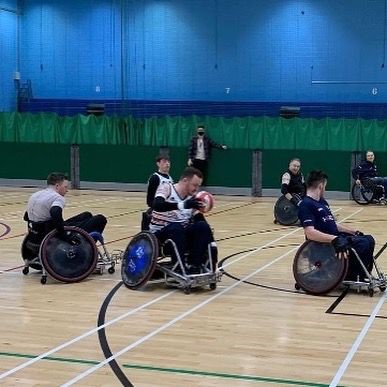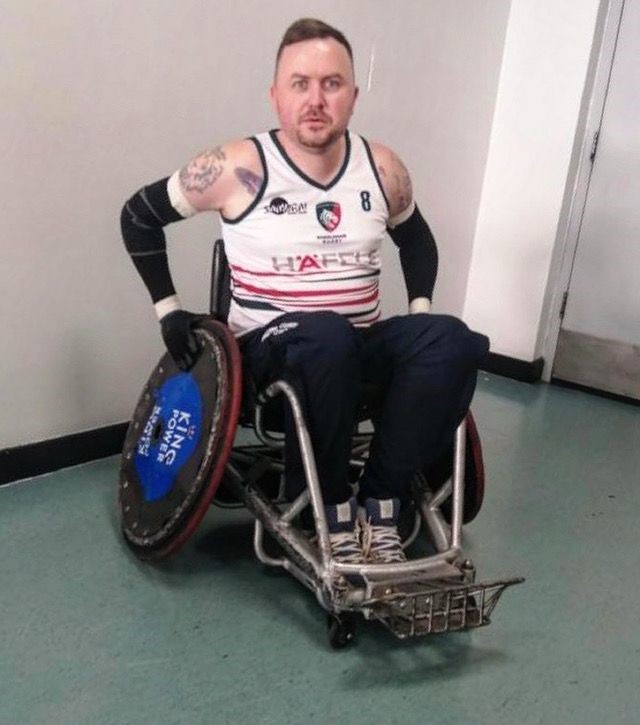
Sunday Spotlight: Rich Copson
May 8, 2022 7:12 pmWe all have things that we want to hide. Secrets, embarrassing stories, a whole host of information that must be kept out of the public eye. But for Rich Copson, he spent years hiding something far less trivial and exceptionally more difficult – his disability.
At the age of Sixteen Rich was diagnosed with Becker’s muscular dystrophy, a regressive condition that severely weakens the shoulders, legs and respiratory system – at a time when all he wanted to be is like his friends.
“Growing up I would try to hide my disability from everyone at school” says Rich, 36, London born but raised in Leicester. I would do things like avoid stairs so people wouldn’t see me struggle as though if I didn’t mention the subject it would stop it happening. I went through a stage of denial, and I just wanted to pretend I was like everyone else”
Initially seeking medical help with a suspicion of simply having tight tendons, Rich’s situation turned out to be far more serious that he would have ever anticipated. Around my 16th birthday I saw a doctor and he immediately told me that something was not right, so referred me to the neurology department” he says, “When I was sitting outside waiting for my appointment, I saw all of the posters on the wall for conditions like Parkinson’s, muscular sclerosis, and just thought to myself that this was going to be a life-changing moment” Rich’s intuition proved to be correct. His fears had come true, and by the age of 25, he would be in a wheelchair. “That diagnosis was a huge blow to me – I didn’t really know where to turn, and from there I was bit lost,” he explains. “One of the main issues I had was that I couldn’t get out of my own head, as I was nervous about the future. It was a very worrying time and ultimately led to me becoming quite anxious and depressed”
As his condition became more virulent into his 20’s, Rich relied on techniques from his school days, further isolating himself from the world. “On nights out I would want to avoid places were far away or had lots of stairs but couldn’t tell anyone why, so I started to feel ashamed” he says. ” As my condition got worse, I started to hide myself away and socially restrict myself because I though that was the easier thing to do. I felt lots of anger and frustration, and I’d just bottle it all up, take it out on myself, or start having dark thoughts about things like suicide.” Rich felt alone. Though he had friends and family around him, his reluctance to show his disability left him detached. However, there was one outlet that could provide a sense of hope – sport.
And it would be here, he insists, that his life truly began, “I went to watch the Great Britain wheelchair rugby team a few years ago, and at the tournament I was talking to someone from the club who suggested I come and try out the sport.” Rich says “It’s not something I had ever considered, but he invited me to a taster day with the Leicester Tigers wheelchair rugby team and from there I fell in love with the game. The sport is incredibly physical, and having worked to get my fitness up after a few months I was asked to be part of the squad”
For Rich, playing for the Tigers provided him with a new lease of life, a different psychological approach to his disability, and most importantly a support system. “One of my favourite things about the team is the sense of community,” he says. “By talking to others with similar conditions to mine, I was able to see that we are all individuals with personalities and stories. Through sport we push our boundaries not letting our disabilities define us” And Rich didn’t stop there.
Since starting wheelchair rugby he has continued to challenge himself, taking on canoeing, water skiing, the world’s fasted zip line in Wales, and his most treasured achievement, completing a 5K marathon on crutches at the Olympic Park. ” That was such a big thing for me because it was so difficult, ” Rich says. “I trained for months by walking across fields on my crutches, and by the end of the marathon my back was completely gone, I gave absolutely everything. Sport gives me the chance to stretch my capabilities, try more difficult activities and test my resilience”
Having gone on to win tournaments and play against Invictus Games opposition alongside his Tigers team mates, Rich also dedicates his time to being an ambassador for Alex’s Wish and other charities across the country. ” I met Emma Hallam, Alex’s mum, at an event five or six years ago and it really inspired me to get involved with the charity, as I realised I’d been spending so much time worrying about myself, when there are people out there in more awful situations than me,” he says.
“I started a fundraising brand on social media, The MD Fighter, to raise awareness of the condition, encouraging people with disabilities to ignore what they can’t do and focus on what they can.” Looking to the future, Rich wants to continue working with schools to educate young people on disabilities, and is also collaborating on the production of an app where people can rate venues based on their accessibility called Access Rating.”
Now thinking back to the 16-year-old he once was, Rich would never have dreamed of being a role model in the community. “I look back now, and never would have thought I’d be in this position,” says Rich. “I used to see having a disability as this negative, almost alien thing, now I don’t think that way anymore. Yes, I may be different to others, but I’m in a community – I’m more than my condition.”


Posted in Sunday Spotlight, Uncategorized

